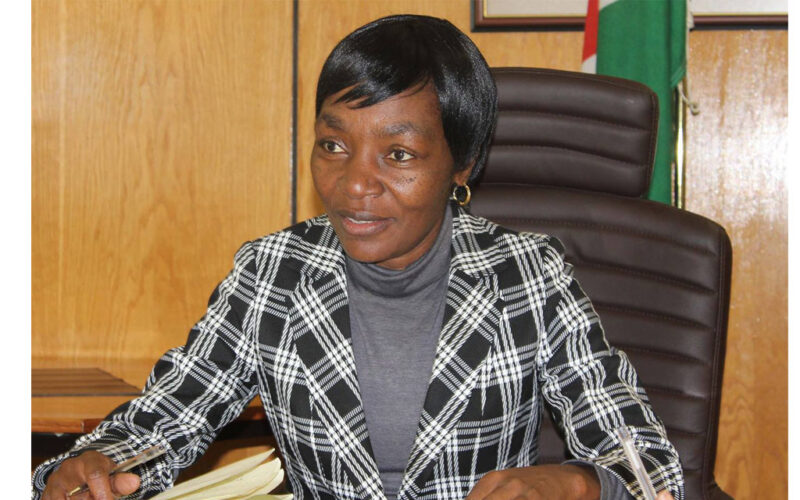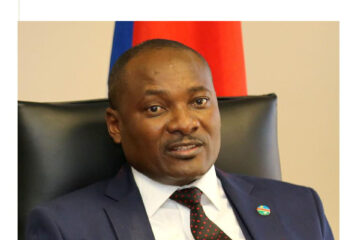Niël Terblanché
THE World Food Programme (WFP) in Namibia has for the past three years gradually moved its focus from food assistance through procurement and distribution to piloting livelihood projects that are aimed at contributing to improved food and nutrition security and sustainable food systems.
In this regard, the WFP works closely with various ministries and government agencies to promote livelihood projects.
To assist with these programmes, Brazil has donated more than N$2.2 million to the Namibian government through the WFP to continue developing more livelihood projects.
During the handover of the generous donation Ericah Shafudah, the WFP Namibia Deputy Country Representative said the funds will be used to upscale five Food System Projects across Namibia
“In 2021, the WFP in partnership with Brazil supported the implementation of five community-based food systems projects at the Tsumkwe Clinic in Otjozondjupa, Olukula Clinic in Ohangwena, Epako Clinic in Omaheke, Stampriet School in Hardap and Opuwo Maternity in Kunene regions,” Shafudah said.
According to Shafudah, these projects are aimed at increasing the production capacities of participating communities, boosting local food production, promoting market access in cases of surpluses, responding to the increasing malnutrition concerns within these regions and increasing access and consumption of diverse and nutritious foods, especially amongst vulnerable people.
“Since inception, these Food System projects have made impactful contributions to the community. More than 50 community members, including women and the youth, have been trained on good agricultural practices, equipping them with the required skills and knowledge to manage the projects,” she said.
Shafudah said the donation presents a unique opportunity for the government of Namibia, supported by WFP to upscale the five Food Systems Projects while facilitating skills and knowledge transfer to target communities.
“This donation will complement national efforts aimed at transforming rural livelihoods and creating employment opportunities for the youth and women,” she said.
Brazil Ambassador to Namibia, Vivian Loss Sanmartin said cooperation between Brazil and Namibia in the food security area has made significant strides in recent years.
“What began in 2019 as a humanitarian action, in response to a request from the Namibian government evolved to a second donation of financial resources in 2020, used to fund five community-based food systems projects to build resilience against recurrent events such as droughts of floods and promote local food value chains and job opportunities,” she said.
She said the latest donation is a token of Brazilian commitment to continue supporting Namibia in the fight against food insecurity through transformative actions.
First of all, the South-South cooperation provided by ABC is demand-driven: it is up to the country which seeks technical assistance to specify its needs. We do not impose areas or projects on the beneficiary. According to the Ambassador, cooperation between Namibia and Brazil is mainly aimed at training, capacity building and transfer of knowledge, so that the communities involved are empowered and can subsequently replicate what they learned.
“We regard cooperation as a win-win process, whereby we share with others our experience, techniques and best practices but we also learn from them in the process,” she said.
Calle Schlettwein, the Minister of Agriculture, Water and Land Reform thanked the Brazilian government for the generous donation and said it will make an inclusive and transformational impact in Namibia.
“This generous financial support of N$ 2.2 million resonates well with Namibia’s national development goals and objective outcomes in the agriculture sector. This is highly valued, especially considering the chosen focal areas to assist our country to reduce vulnerability and to attain food and nutrition security at community and national levels,” he said.
The Minister said that the achievement of Namibia’s goals of food self-sufficiency and food security and the immediate impact of the donation would enable the beneficiary communities to be empowered to produce their own food, thus becoming less dependent on relief programmes.
“This donation allows beneficiaries to improve nutritional intake and enhance the quality of lives and livelihoods, encourage schooling and learning through cognitive skills development and human capital formation, mainstreaming beneficiaries into productive economic activity by enabling income generation and pushing back the frontiers of poverty and vulnerability, and contributing to national food security and self-sufficiency objectives,” he said.
According to the minister, Namibia has made progress in moving towards food self-sufficiency.
“For proteins, Meat and fish Namibia is in a surplus position for beef and fish. We are indeed competing with our friends the Brazilians in the export markets,” he said.
With regard to basic staples such as maize, Namibia is moving close to full self-sufficiency and local production stands currently at around 80 percent of total demand.
He said millet and wheat are still far below the target and need to improve significantly. According to Schlettwein, several horticultural products have improved to above the 50 percent local production mark and efforts are continuing to further increase production.
We are thankful that we could take hands with the World Food Programme to efficiently utilise this important donation,” he said.




